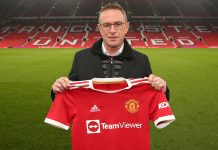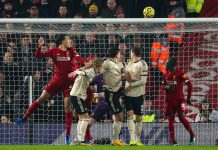Given the hype surrounding Ralf Rangick’s arrival and the demeanor with which he handed the press, it is an understatement to say the expectations were high. Now that he has overseen his first game in charge, there is enough indication of what to expect going forward and the main areas he will have a challenge in. From our analysis, here are the 6 changes Manchester United fans can expect from the new coach and four areas he has the most work to do.
Tighter Pressing
Gegenpressing was the buzzword all week long as soon as Rangnick to Manchester became half a possibility. While some regard him as the father of gegenpressing, Rangnick has been cautious when discussing his approach. He stressed that his side would not press for pressing sake and his style of football has to be tailored to the players at hand, not the other way round.
Indeed his RB Leipzig side main characteristic had areas where they pressed and targeted for turnovers. In his first match in charge, it was evident that he wanted tighter pressing but not just all over the pitch but higher up the pitch.

What used to be a lackadaisical approach with one forward half-heartedly closing down the defenders with little to no support was replaced with purposeful targeting and traps with three of four players closing potential passing avenues. As a result, Manchester United made 12 ball recoveries in the final third, the highest amount they have ever done since Sir Alex Ferguson retired. As a result, Crystal Palace was pinned at the back, resorting to long, inaccurate balls and most of the turnovers were serious goal threats.
Fast Ball Movement
Another thing that worked against Manchester United was the labored ball and player movement. If you exclude Ole Gunnar’s heydays, Manchester United has always struggled to get the ball to someone in the box. Back-passing, sideways passing, and players staying too long on the ball or running in cul-de-sacs were all features as runs and chances went unexploited. Even under Ole Gunnar, the fast movement was during breaks against teams that powered forward and relied on United’s pacy forwards.
The biggest challenge has been breaking teams employing a low block. Against Palace, we saw quick crosses, fast release of players, and forward ball movement from the center backs, the midfielders, and forwards. When United were near irrepressible in the first half alone, they had 26 passes into the opposition box, 26 touches in the opposition box, and 48 passes in the final third. In the first 30 minutes, they had 10 shots which are more than the 9 they managed all game against Watford.
Cohesive Patterns of Play
One of Ole Gunnar’s main challenges was having a definitive style of play. In many of his later games, there was a heavy reliance on individual brilliance, especially on Bruno calling back to a time when David de Gea was the sole reason the team did not end up a midtable team. The tweaks to formation appeared more desperate than intentional as the gameplay remained disorganized.

In his first session, with only 45 minutes (according to Rangnick) to work on his formation, it was clear for 90 minutes what shape United was playing with. The 4-2-2-2 met his intention for pressing high up the pitch ensuring neither the forwards nor the midfield was overwhelmed. Further, it allowed space for the wing play with the forward overlapping and getting in first-time crosses. More importantly, it ensured there were often enough bodies in the box area to pass to or target with crosses. With more time, there is evidence that more fluidity and intricate patterns of play will develop.
Dominance and Control in Games
While gegenpressing was the word on every commentator and football fan’s mouth, Ralf Rangnick has been insistent on the need for control. He wants his United team to be proactive and control the play, seeking to recover the ball and use it constructively. We saw this in the Palace game even past the first 30 minutes. Even in the second half, with the tempo lessened, the purpose remained, and Crystal Palace struggled to find quality chances.
You expect a team with players the caliber of Manchester United to dominate most other teams, but that hardly happens. Which explains why it lasts season relegation battling teams were able to get wins at Old Trafford and where what should be three points turn out to be a battle to salvage a draw. For a team that has often gone through phases of the game almost absentmindedly, often reacting and at times even failing in that, attaining this control would be refreshing.
A Genuine Fight for Places Featuring a Surprising Fullbacks’ Competition
There have been rumors that Ole Gunnar had favorites, and fans have yearned to see players like Van De Beek get a chance. Towards the end of his reign, Lingard and Bailly reportedly felt they were not getting the minutes promised despite some of the starters’ poor form and injuries. Fortunately, as is the case when a new manager arrives, everyone has an equal chance. Given the new system of play expected, it is upon the players to win their places without the disadvantage of bias.
Ralf Rangnick has already shown he is open to giving people a chance, and even Phil Jones made a cameo against Palace while Elanga made the team. The Young Boys match provides a chance for more players to stake their claim in the team. However, the one fight no one saw coming was both fullbacks positions. Aaron Wan Bissaka and Shaw may all play against Young Boys and come the weekend, and we shall know who has a head start for positions once thought as a given.
Fred’s Prominence
The most surprising feature of all this change is Fred’s upturn in the form. It may have started with Carrick’s last game, but it carried to the game against Palace, where he scored. Playing in an advanced position makes him more effective at closing down opponents, and it has also improved his goal contribution.

Against Crystal Palace, his contribution included;
- 95 total touches
- 83% pass accuracy
- 16 total duels contested
- 10 duels won
- 10 passes into the final third
- 9 attempted tackles
- 7 successful tackles
- 7 ball recoveries
- 2 clearances
- 2 shots
- 1 goal
Whatever Ralf Rangnick’s plan going forward is, harnessing the energy Fred brings to the game and improving his goal contributions will be vital to that success, at least in the short term.
While there is much more to look forward to, these four areas call for urgent attention, and if there is no significant improvement, they risk derailing any improvement.
Cheap Fouls
The whole idea behind pressing, especially in the opposition’s half, is to win back the balls in areas where a counterattack would be most devastating, giving the opponent little time to react. However, if several attempts at winning the ball result in fouls, it defeats the purpose. Such fouls may slow down the opponent, but they neither advance your objective. Further, United has a penchant for conceding goals from set-pieces dangerous areas, and they are not the best at defending set-pieces. Scott Mctominay, Bruno Fernandes, and all fullback options have to improve in this aspect, given their role and propensity to be drawn to a foul.
Maintaining Intensity
Another area for improvement that should ideally come with further training is maintaining the intensity. Part of having control is never giving the opponent time to find a rhythm and exert their game, and since Manchester United is not going for Tiki-Taka, then they will need to maintain their movement on and off the ball. The pressing should not be on and off, and the runs down the channels should be consistent for 90 minutes. It calls for utmost fitness and teamwork, and that’s where application to the manager’s instruction should earn fit and committed players’ chances.
Passing Accuracy
Equally crucial to the philosophy of winning the ball high up the pitch and having fruitful counters is the accuracy of passing. No United player consistently shines in this area, especially now that Rangnick wishes to implement vertical passing. United cannot afford to have their counters breaking down due to a misplaced pass, especially with the fullback in advanced positions. The crosses, too, have to be aimed at someone instead of hopeful drills across the opposition box. It will improve goal-scoring chances and prevent the risk of the Red Devils being caught out in possession.
Decision Making
Finally, decision-making among the team has to improve, and you hope with clear patterns of play and routines it will. Defenders can no longer keep on being caught on the ball, midfielders choose the wrong option and forwards have two minds. If you look at Guardiola’s City in full motion, it represents telepathy, there is constant movement, but you can exactly tell where the ball will go. Players can still dribble and run with the ball but to a productive end, or else they risk the sidelines.
Rashford, Sancho, Greenwood (who really should improve his general passing), and even Bruno and Pogba can be infuriating, often choosing the complex route to goal with better options at hand. Maguire often dallies on the ball at the back and pressing forwards know to target him.
There is a fresh new era at Manchester United, and even Klopp surmised that the team would be better organized, which is not good news for the rest of the teams. There are clear signs of the direction Ralf will take, and if he manages to work on the four areas among others, then perhaps it wouldn’t be long before the ‘Glory Glory Man United’ chants ring true.









